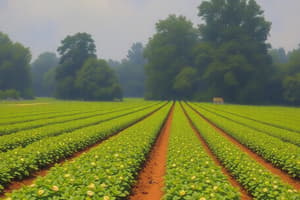Podcast
Questions and Answers
What are food crops and provide two examples?
What are food crops and provide two examples?
Food crops are plants grown primarily for consumption. Examples include cereals and vegetables.
Explain the importance of soil management in crop production.
Explain the importance of soil management in crop production.
Soil management is crucial for maintaining soil quality, which directly affects crop yield. Techniques like crop rotation improve soil fertility and health.
What are essential nutrients for crops and name one fertilizer type?
What are essential nutrients for crops and name one fertilizer type?
Essential nutrients for crops include Nitrogen (N), Phosphorus (P), and Potassium (K). One type of fertilizer is organic fertilizer.
Describe the concept of Integrated Pest Management (IPM).
Describe the concept of Integrated Pest Management (IPM).
What is organic farming and what does it focus on?
What is organic farming and what does it focus on?
Define precision agriculture and its purpose.
Define precision agriculture and its purpose.
What are some challenges faced in crop production due to climate change?
What are some challenges faced in crop production due to climate change?
Why is cost management important in crop production?
Why is cost management important in crop production?
Flashcards are hidden until you start studying
Study Notes
Crop Production
- Definition: The process of growing plants for food, fiber, fuel, and other products.
- Types of Crops:
- Food Crops: Cereals, legumes, fruits, and vegetables.
- Cash Crops: Grown for commercial value (e.g., cotton, tobacco).
- Fibre Crops: Used for textiles (e.g., cotton, flax).
Crop Management
-
Soil Management:
- Importance of soil quality for crop yield.
- Techniques: Crop rotation, cover cropping, and conservation tillage.
-
Water Management:
- Irrigation methods: Drip, sprinkler, surface.
- Importance of water conservation to prevent drought stress.
-
Nutrient Management:
- Essential nutrients: Nitrogen (N), Phosphorus (P), Potassium (K).
- Use of fertilizers (organic and synthetic) to enhance soil fertility.
-
Pest and Weed Management:
- Integrated Pest Management (IPM): Combines biological, cultural, physical, and chemical methods.
- Importance of identifying pests and using resistant crop varieties.
Crop Life Cycle
- Planting: Selection of seeds and optimal planting times.
- Growing: Factors influencing growth include sunlight, temperature, and moisture.
- Harvesting: Timing and methods to ensure maximum yield and quality.
- Post-Harvest Management: Storage, processing, and marketing of crops.
Sustainable Practices
- Organic Farming: Avoidance of synthetic chemicals, focus on biodiversity.
- Agroforestry: Combining agriculture with forestry to enhance productivity and sustainability.
- Conservation Agriculture: Practices that enhance soil health and reduce erosion.
Technological Advances
- Precision Agriculture: Use of technology to monitor and manage field variability.
- Biotechnology: Genetic modification to enhance crop resilience and yield.
- Drones and Sensors: Used for monitoring crop health and optimizing resource use.
Economic Considerations
- Market Trends: Understanding supply and demand dynamics.
- Cost Management: Budgeting for inputs and labor to maximize profitability.
- Risk Management: Insurance and diversification strategies to mitigate losses.
Challenges in Crop Production
- Climate Change: Impact on weather patterns, pest prevalence, and water availability.
- Soil Degradation: Erosion, nutrient depletion, and contamination.
- Global Competition: Pressure to increase efficiency and reduce costs.
Crop Production
- Definition: Involves growing plants for diverse purposes, including food, fiber, and fuel.
- Types of Crops:
- Food Crops: Includes cereals (e.g., rice, wheat), legumes (e.g., beans, peas), fruits, and vegetables.
- Cash Crops: Cultivated primarily for commercial gain, such as cotton and tobacco.
- Fibre Crops: Specifically grown for textile production, like cotton and flax.
Crop Management
- Soil Management:
- Soil quality is crucial for achieving high crop yields.
- Techniques include crop rotation, cover cropping, and conservation tillage to maintain soil health.
- Water Management:
- Various irrigation methods utilized include drip, sprinkler, and surface irrigation.
- Emphasis on water conservation practices to avoid drought-related stresses.
- Nutrient Management:
- Key nutrients for crops include Nitrogen (N), Phosphorus (P), and Potassium (K).
- Fertilizers, both organic and synthetic, are employed to improve soil fertility.
- Pest and Weed Management:
- Integrated Pest Management (IPM) strategically combines biological, cultural, physical, and chemical control methods.
- Recognizing pests and utilizing resistant crop varieties are essential for effective management.
Crop Life Cycle
- Planting: Involves selecting appropriate seeds and determining the best planting times.
- Growing: Success depends on optimal conditions, such as adequate sunlight, temperature, and moisture.
- Harvesting: Timely harvesting and employing suitable methods ensure peak yield and quality.
- Post-Harvest Management: Focuses on proper storage, processing, and marketing of harvested crops.
Sustainable Practices
- Organic Farming: Emphasizes the elimination of synthetic chemicals and promotes biodiversity.
- Agroforestry: Integrates agricultural practices with forestry systems to boost productivity and sustainability.
- Conservation Agriculture: Aims to improve soil health and reduce erosion through specific practices.
Technological Advances
- Precision Agriculture: Implements technology for detailed monitoring and management of field variability.
- Biotechnology: Involves genetic engineering to enhance resilience and yield of crops.
- Drones and Sensors: Utilized for assessing crop health and optimizing resource allocation.
Economic Considerations
- Market Trends: Important to analyze supply and demand to sustain competitiveness.
- Cost Management: Budgeting for inputs and labor is essential for maximizing profitability.
- Risk Management: Strategies, including insurance and diversification, help mitigate potential losses.
Challenges in Crop Production
- Climate Change: Alters weather patterns, pest dynamics, and water availability crucial for farming.
- Soil Degradation: Includes challenges like erosion, nutrient depletion, and chemical contamination.
- Global Competition: Farmers face increasing pressure to enhance efficiency and reduce operational costs.
Studying That Suits You
Use AI to generate personalized quizzes and flashcards to suit your learning preferences.




